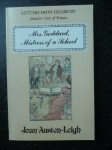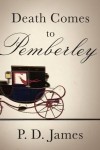I’ve been dipping back into Jane Austen the last week or so. I stumbled on a ‘sequel’ to Sense & Sensibility by Joan Aiken — a favorite author from my childhood — so I jumped on it. And of course, reading Eliza’s Daughter, made me question my memory of events in S&S, so I had to re-read that. Then I was deep in, so I wanted to read Persuasion (mostly because it’s the one I don’t own of the Austen books I like best — those being Emma, S&S, P&P and Persuasion. Northanger Abbey is okay but lighter, and Mansfield Park I don’t like much at all).
So anyway, I went to pick up Persuasion at the library (no need to put this on hold, every location has multiple copies of all things Austen, and Persuasion being less popular, it was indeed there on the shelf waiting for me). And… right next to it was something called A Visit to Highbury, a ‘different perspective’ of the events in Emma by the great great grand-niece of Ms. Austen. There’s another one after it, Later Days at Highbury.
Sequels done by someone other than the original author are always iffy. And sequels written 200 years after the original, even iffier. Sequels of fantastically popular, iconic, still-in-print works — well, that’s taking a risk of a whole other magnitude. Purists will despise you, fans might mock you, and haters will crush you. These two novels took very different attitudes toward their source material, and the results are very different indeed.
Joan Aiken is a pretty popular author. She wrote Nightbirds on Nantucket, Black Hearts in Battersea, and dozens of other children’s books. I own those two plus The Wolves of Willoughby Chase — three related books (and there are many more, apparently, that were not in my local library as a child). She wrote more than 100 books in her 79 years on the planet. This is no upstart trying to get a bump from the Austen obsessions of the rest of us. I was excited to read this one.
 Aiken’s book is a first-person novel from the perspective of Eliza’s daughter, Eliza’s daughter, also named Eliza. That would be Eliza — first love of Colonel Brandon — her daughter, Eliza — child of the unknown father who seduced Eliza in her marital misery – and her daughter, Eliza — daughter of scapegrace Willoughby, first love of Marianne. Got that? It was a bit of a struggle, I kept losing track of which generation we were on. For instance, when this Eliza (and we never see the others) says she’d never seen Colonel Brandon, I had to go to S&S and check the story, because I was sure he said he’d seen her often — but that was her mother, not her.
Aiken’s book is a first-person novel from the perspective of Eliza’s daughter, Eliza’s daughter, also named Eliza. That would be Eliza — first love of Colonel Brandon — her daughter, Eliza — child of the unknown father who seduced Eliza in her marital misery – and her daughter, Eliza — daughter of scapegrace Willoughby, first love of Marianne. Got that? It was a bit of a struggle, I kept losing track of which generation we were on. For instance, when this Eliza (and we never see the others) says she’d never seen Colonel Brandon, I had to go to S&S and check the story, because I was sure he said he’d seen her often — but that was her mother, not her.
Aiken has no qualms writing a very different future for the principal characters of S&S — we see Elinor, Edward Ferrars, Marianne, and Mrs. Dashwood, as well as brief glimpses of Lucy Steele Ferrars and her husband, Robert. Edward is bitter and stoic, Marianne is unfeeling and selfish, Mrs. Dashwood has lost her mind, and only Elinor comes off as a decent person — but she’s miserable. This is NOT the future we wished for them! And the Interwebs is quite full of people telling Austen fans to avoid this book at all costs. I saw none of that chatter before I picked it up, and I was sorry to see Aiken’s complete lack of faith in these characters’ futures. I wonder why she even wrote a book that dealt with them, since she seemed to dislike them excessively? Maybe she wanted us all to know how she felt about them.
Eliza’s story is compellingly readable and rings true as a real person and a real life in almost every instance. Actually, it all rings true (because who actually reveals everything about themselves?), but a few choices made by the author rendered the whole book less satisfying.
First the good: Eliza is scrappy and no-nonsense, kind and generous to a fault. She rescues a baby from her wet nurse’s neglect, refuses to gossip to make her school life easier, overcomes the negligence of her guardian (Brandon does not come off well, and the blame is placed on Marianne), escapes from would-be rapists, and rescues Elinor from starvation and fever. The plot is one damned thing after another for this poor girl from the wrong side of the sheets. But she never gives up, and rarely complains.
The bad: this ‘never complains’ part is part of the problem. Her sexual abuse as a child (by her tutor) isn’t even mentioned until she’s an adult — not even hinted at properly. And the book ends (seriously, the last paragraph) with her revealing that she’s PREGNANT, when there has been no hint of any kind of sexual encounter occurring in the previous decade or more. WHAT?! This is what sent me to the internet, wondering if there was a sequel/interview/close reading somewhere that could tell me what the heck was going on here. I found nothing but vitriol aimed at Aiken for her treatment of beloved Austen heroines and heroes.
This is not to say that the book is poorly written, exactly. If that sentence had been left out, I would have closed it happy — even with the character assassination. I can ignore Aiken’s opinion of the future Dashwoods, et. al., this book would have been a fine book unaffiliated with any Austen characters at all. But why make a poor attempt to dress up the ending by 1) revealing a pregnancy we have no investment in, and 2) making every reader doubt their reading of the whole book? Seems a poor choice for an otherwise accomplished text.

A Visit to Highbury is a VERY DIFFERENT voyage into the world of Austen. Joan Austen-Leigh (hey, both authors are named Joan… just noticed that) makes a point of saying in the introduction that she puts not a single word in the mouths of Austen’s speaking characters in Emma, adheres strictly to the timeline and details of that novel, and only makes up things about the silent characters in Emma (notably Mrs. Goddard, mistress of the school where Harriet Smith lives). The story is told in a series of letters between Mrs. Goddard and her sister in London. Mrs. Pinkney is newly widowed, remarried and lonely for people, so her sister sends her gossipy letters (almost wrote ‘emails’ right there) about the fine folks in Highbury. Mrs. Goddard’s opinions and descriptions of Emma and her friends and family mirror exactly what Austen wrote in Emma, so purists can read it with no qualms.
The book is thoroughly enjoyable. I read it in one go, not putting it down until it was done (it is only 180 small pages). The events taking place in letters written and then received and responded to create a kind of constant cliffhanger situation as we wait for the other to respond, answer questions and clear up confusion. Of course, there is more going on in their lives than what happens in Emma — will Mrs. Pinkney ever be happy with her husband. Are those poor girls at the school in London really being mistreated? Lots of new plot that in no way alters what we know and love about Highbury and its residents, but it adds some background and a new list of events and characters to love (some quite similar to other Austen creations, including the obligatory visit to Bath, Naval officers, illegitimate children and apothecaries for everyone). I look forward to the sequel.
I think there is room for some middle ground between the two approaches to (what amounts to) Austen fan fiction. Aiken makes you despair of every picking up another one, and Austen-Leigh treats the characters as demigods not be to besmirched by her unworthy hands.

I think the best Austen fan-fic I read was Death Comes to Pemberley, what could properly be called a sequel to Pride and Prejudice by P.D. James, a popular author of crime fiction.* The events take place a few years after the end of P&P, when Lizzie’s wild sister, Lydia and her ne’er-do-well husband, Wickham, arrive at Pemberley. The book is a murder mystery totally in keeping with the characters of P&P, and a great read. James clearly loved those characters, but wasn’t afraid to shake things up a bit.
I can’t imagine taking on the challenge of writing in Austen’s world — I’d be more likely to take the ‘inspired by but no way I’m actually calling my character Elizabeth Bennet’ route, done by tons of writers (my most recent favorite, the speculative fiction books of Mary Robinette Kowal). You get points for bravery, but be prepared for the firing squad.
*I also read a collection of short fiction ‘inspired’ by Austen’s work (Jane Austen Made Me Do It), an uneven collection that none-the-less contained some real gems.